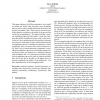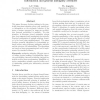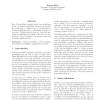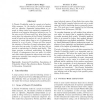132
Voted
ISIPTA
2005
IEEE
15 years 8 months ago
2005
IEEE
This paper addresses the following question: how should we update our beliefs after observing some incomplete data, in order to make credible predictions about new, and possibly i...
105
Voted
ISIPTA
2005
IEEE
15 years 8 months ago
2005
IEEE
A consistent concept of logical probability affords the employment of interval probability. Such a concept which attributes probability to arguments consisting of premise and con...
110
Voted
ISIPTA
2005
IEEE
15 years 8 months ago
2005
IEEE
133
Voted
ISIPTA
2005
IEEE
15 years 8 months ago
2005
IEEE
The paper presents an efficient solution to decision problems where direct partial information on the distribution of the states of nature is available, either by observations of ...
124
Voted
ISIPTA
2005
IEEE
15 years 8 months ago
2005
IEEE
This paper discusses decision making in the practically important situation where only partial prior information on the stochastic behavior of the states of nature expressed by im...
114
click to vote
ISIPTA
2005
IEEE
15 years 8 months ago
2005
IEEE
Normative study of probability-agreeing orderings of propositions, much of it rooted in a false but evocative conjecture of Bruno de Finetti, has typically sought to credal ration...
173
click to vote
ISIPTA
2005
IEEE
15 years 8 months ago
2005
IEEE
Sets of probability measures which form neighbourhoods of classical probability measures are studied. An application of Jeffrey’s rule of conditioning to forming neighbourhoods...
120
click to vote
ISIPTA
2005
IEEE
15 years 8 months ago
2005
IEEE
A protocol for the elicitation of imprecise probabilities based on linear programming is applied to the case of two continuous variables. Two medical experts were elicited. The re...
143
click to vote
ISIPTA
2005
IEEE
15 years 8 months ago
2005
IEEE
The main goal of this paper is to describe a new semantic for conditional independence in terms of no double counting of uncertain evidence. For ease of exposition, we use probabi...
111
click to vote
ISIPTA
2005
IEEE
15 years 8 months ago
2005
IEEE
A Chaotic Probability model is a usual set of probability measures, M, the totality of which is endowed with an objective, frequentist interpretation as opposed to being viewed as...




